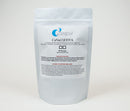Description
- CaNa(2)EDTA is a synthetic amino acid, recommended by the CDC, to be used for the treatment of chelating lead, cobalt, cadmium, tin, aluminum, nickel and antimony.
- Harmful heavy metals may cause or worsen health conditions including decreased circulation, degenerative diseases, diabetes, decreased adrenal gland function, cardiac function and Autism.
- CaNa(2)EDTA, in its oral form, is excreted through the bowels with little or no absorption.
- Chelation using CaNa(2)EDTA via suppository has proven to be as effective, safer than, and more cost effective (80% less expensive) than the intravenous form of CaNa(2)EDTA because it eliminates many of the problems commonly associated with intravenous(IV) CaNa(2)EDTA
Zetpil™ Suppository Advantage
Zetpil™ delivers nutrition via the rectum with the use of suppositories that have a unique, all- natural formulated base that has revolutionized not only this mode of delivery, but also the ability to obtain nutrients in a far more efficacious method. These suppositories are a result of combining natural ingredients with a non-irritating, rapid melting (5-6 minutes), readily absorbable (superior retention), antioxidant base material (free radical scavenging ability) and delivers the nutrients directly into the bloodstream in less than 20 minutes in a highly effective manner. Oral supplements are exposed to the hazards of stomach acid, digestive enzymes, food-related breakdown, first pass metabolism, and other bioavailability issues in the gastro-intestinal system.
Additionally, many raw materials simply have a very low bioavailability , and only achieve around 10% or less (commonly <1%) absorption rates, even if the patient is in optimal health condition. Compromised health, age, or certain conditions that result in an inability to take oral nutrients often preclude these patient populations from obtaining the necessary nutrition to stay healthy which often exacerbates chronic health issues.
Zetpil™ suppositories are a NOW solution to delivering the necessary nutrients to patients, on a daily basis, that is both easy, comfortable and cost effective. The safety and noticeable effectiveness of these products will far outweigh any initial hesitation you have regarding this mode of delivery.
What is CaNa(2)EDTA?
CaNa(2)EDTA is Calcium Disodium Ethylenediaminetetraacetate Dihydrate. It is a synthetic amino acid first manufactured in the late 1930s to detoxify war-based chemical agents but was then applied for the treatment of lead toxicity in the 1940s. “The chemical process of chelation refers to the creation of a bond formed by a complex molecule (chelating agent) with a positively charged ion (chelate). The chelating agent (ie: EDTA) binds to the chelate (ie: heavy metal), permitting its excretion.” http://www.ncbi.nlm.nih.gov/pmc/articles/PMC4162329/
The center for Disease Control (CDC) has recommended lead poisoning chelation therapy with EDTA for decades and is widely accepted as the best form of treatment for chelating the following toxic heavy metals with a low incidence of adverse side effects.
- lead,
- cobalt,
- cadmium,
- tin,
- aluminum,
- nickel and
- antimony.
Why Is the Chelation of Heavy Metals So Important?
We are exposed to many heavy metal toxicities in our daily lives and most often do not recognize our slowly increasing heavy metal burden which can lead to a number of health issues. Some common examples are cigarettes, auto exhaust, newspapers, canned and frozen foods, aluminum cookware, insecticides, fungicides, pesticides, water pipes, cosmetics, hair dyes, antacids, and deodorants.
Harmful heavy metals may cause or worsen health conditions including, but not limited to decreased circulation, degenerative diseases such as Alzheimer’s, diabetes, decreased adrenal gland function, cardiac function and Autism. The human body requires about 70 trace elements/minerals, such as magnesium, zinc, copper and manganese for optimal function, but there are several heavy metals that are classified as toxic to human physiology. They include lead, mercury, aluminum, arsenic, cadmium and nickel. These harmful heavy metals have no place in the human body and may be toxic even at very low levels; therefore the need to remove them is great.
Signs of Potential Heavy Metal Toxicity:
- Nausea
- Vomiting
- Diarrhea
- Abdominal pain
- Central nervous system dysfunction
- Heart problems
- Anemia
- Fingernail or toenail discoloration.
Payment & Security
Your payment information is processed securely. We do not store credit card details nor have access to your credit card information.


